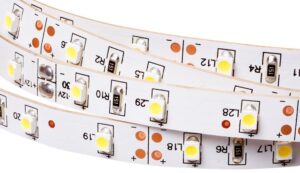Best Practice Metal Core Printed Circuit Board in LED Products
2022-10-11
Printed circuit boards have greatly expanded the development of electronic applications. Metals are good conductors of electricity and transmit power to different components.
Metal core PCBs are often used in the LED lighting industry, power supplies, amplifiers, etc. So, what are LED products?
What are LEDs products?
LEDs are widely used in a variety of lighting products, as well as certain accessories. Compared to other conventional products, LEDs are very cost-effective, but heat loss makes LEDs sometimes unstable and unable to achieve maximum efficiency for use. To solve this problem, metal core PCBs are a good solution.
What is a metal core PCB?
Metal core PCBs are similar to standard PCBs, with the difference that the addition of metal layers to metal core PCBs adds a variety of advantages that have led to their widespread use. Because of their exceptional quality and high thermal conductivity, metal-core PCBs are considered a better choice than glass epoxies.
The most commonly used metal for metal core PCBs is aluminum
Which is an inexpensive metal with good thermal conductivity, and copper is the second most commonly used metal. The choice of aluminum or copper depends on which metal is more suitable for the product you are designing, the main difference between Aluminum and Cu:
-Copper PCBs have better heat transfer and dissipation than aluminum PCBs
-Aluminum is lighter than copper, making it the best choice for lightweight LED PCBs
-Aluminum is cheaper
What is the difference between metal core PCBs and FR4 PCBs?
-
Thickness
FR-4 PCBs have more options when it comes to thickness, but metal core PCBs have limited variation, which depends on the thickness of the backplane and the thickness of the dielectric sheet.
-
Heat dissipation
Metal core PCBs can dissipate heat through holes, whereas FR-4 PCBs transfer heat through holes.
-
Solder
Metal core PCBs have a white resist layer and are only used on the top, whereas FR-4 PCBs have a wide choice of resist layer colors for the top and bottom.
-
Electrical Conductivity
Metal is a conductor of electricity and therefore metal core PCBs have a higher electrical conductivity. The thermal conductivity of metal cores ranges from 1w-4w, whereas FR-4 only offers a thermal conductivity of 0.3w.
-
Plated through holes
PCB plated through holes are not suitable for metal core single layer PCBs, metal cores are more suitable for SMT.
-
Stiffness
Metal core PCBs are able to withstand more tremendous shock and vibration and are 2-4 times stiffer than FR-4 or polyimide.
-
Cost
Metal core PCBs are somewhat more costly than FR-4 PCBs.
What makes metal core PCBs the best choice for making LED products?
Metal core PCBs play a key role in overheating components, transferring heat from one side to the other where it disappears, thus increasing the life of the product. While LED products need to emit a lot of heat, metal core PCBs can quickly transfer heat to prevent overheating. Aluminum is also a more stable metal than other metals, making it more suitable for use in LED products.
The metal core PCB is also highly conductive and has enough space to accommodate LEDs, thus increasing the density of the LEDs and producing enough light for high performance.
At KingPCB
We offer the highest quality metal core PCBs, and with high reliability, fast delivery, competitive pricing and over 10 years of manufacturing experience, you can trust us to meet any of your PCB project manufacturing needs!
To get more information about PCB manufacturing and PCB assembly services, and explore our PCB manufacturing services. Get a quick quote at sales@kingpcb.com or call us at +86-755 2734 9019



